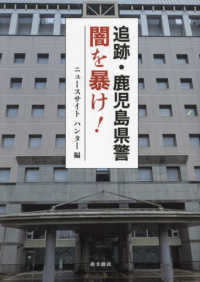- ホーム
- > 洋書
- > 英文書
- > Politics / International Relations
Full Description
In Volume Three of this four-volume series, we examine the rhetorical development that occurred during the first two terms of Vladimir Putin's tenure as president of the Russian Federation. Initially, Putin appeared to follow in the path set by his predecessor, Boris Yeltsin, vowing that Russia was, at heart, a European nation and would be a westward facing democracy going forward. He even mentioned partnering with the EU and NATO. Eight years later, at the 2007 Munich Security Conference, Putin excoriated the West for, in his words, attempting to create a "unipolar world" in which NATO expansion threatened Russia's security, the United States acted as the world's sole "hegemon," and Europe simply followed orders, relinquishing any sense of agency in its own affairs.
Contents
Contents
List of Photos
Acknowledgements
Contributors
Note to Readers
Preface
Introduction to Volume Three
Part One: Initial Considerations
1. The Rhetorical Sources of Putin's Evolving Governance Philosophy
Alexander Panarin
Alexander Dugin, 2017
Alexander Dugin, undated
Lev Gumilev—Passionarity Party
Lev Gumilev and Anna Akhmatova
Statue of Lev Gumilev
2. Strategic Goals Underpinning the Struggle to Maintain a Slavic Majority in Russia:
Putin, Compatriots, and Fellow Countrymen
3. The Sinking of the Kursk: A Soviet Response to a Russian Tragedy
The Kursk Nuclear Submarine
4. The Political Lexicon of Putin the "Democrat"
Part Two: Redefinition of the Russian Nation
The Russian Tricolor
The Russian Coat of Arms
The Russian Armed Forces Flag
5. New/Old Russian Symbols as Arguments for Identity Transformation:
Reviving Ghosts Is a Tricky Business
Vladimir Putin and Boris Yeltsin, 1999
6. Reconstituting the Body Politic: Yeltsin, Putin, and the Struggle
for Russian (Self-)Identity
7. Identification, Division, and Consubstantiality Between:
A Burkean Assessment of Political Transformations in Post-Soviet Russia
8. Russian National Identity as Argument Construction: An Assessment
of Political Transformations in Russia
9. Argumentation, Globalization, and the New Nationalism:
Implications and New Directions
Part Three: "Democracy in Action" or "Democracy Inaction"
10. Argumentation and Education: Preparing Citizens
in Cultures of Democratic Communication
11. Liberty vs. Security in Putin's "Managed Democracy": Back to the Future?
12. The Role of Communication in Political Transition: A Review Essay
13. Definition and Political (Un)change: The State of Political Rhetoric
in Putin's Russia
14. The Authoritarian Turn: Vladimir Putin's 2005 Presidential Address
to the Federal Assembly
15. Citizen Putin: Presidential Argument and the Invitation
to (Democratic) Citizenship
Part Four: International Relations
Alexei Salmin
16. Foreign Policy Challenges and the Historical "Anchors" of Russian Federation
Foreign Policy after September 11, 2001
Vladimir Putin and George Bush, 2001
Vladimir Putin at the UN
17. Managing "Democracy" in the Age of Terrorism: Putin, Bush,
and Arguments from Definition
Viktor Yushchenko, 2004
Viktor Yanukovich, 2004
18. Presidential Rhetoric on a National and International Scale:
The Ukrainian Presidency through the Lens of Russian and Ukrainian Politics
Vladimir Putin and Robert Gates, 2007
Angela Merkel in Munich, 2007
Robert Gates, John McCain, and Joseph Lieberman with Angela Merkel, 2007
Robert Gates, John McCain, and Joseph Lieberman with Vladimir Putin, 2007
Robert Gates, John McCain, and Joseph Lieberman in Conversation, 2007
19. Rhetorical and Argumentative Strategies in Putin's 2007 Munich Speech
Afterword
Vladimir Putin and Dmitri Medvedev
Bibliography
Index
-

- 電子書籍
- 大逆の門【タテヨミ】第6話 picco…
-

- 電子書籍
- cafe-sweets vol.157






